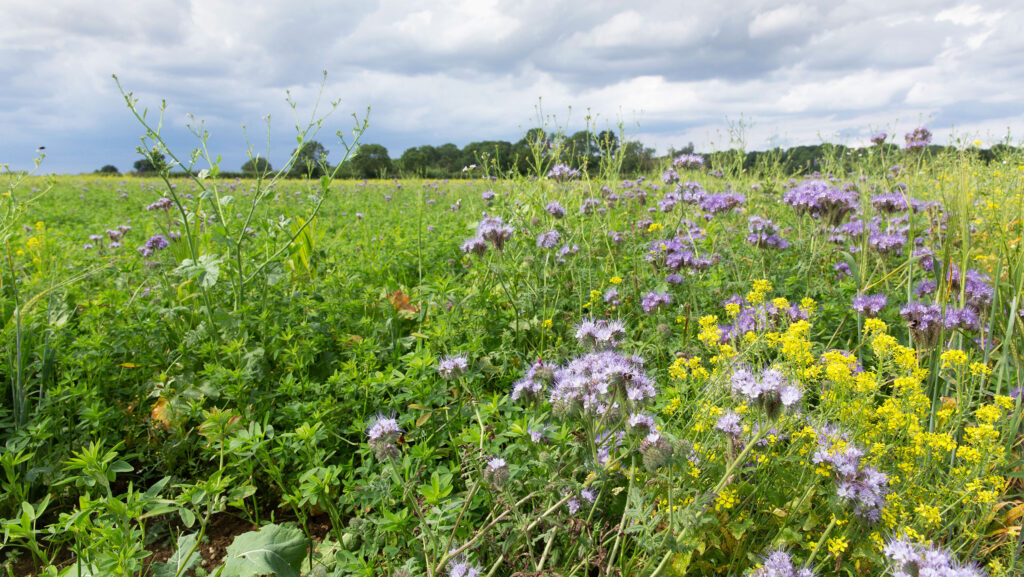Cereals 2025: Which environmental actions would farmers keep?
 ©Tim Scrivener
©Tim Scrivener Talk at Cereals 2025 about “public money for public goods” being under threat means that growers visiting the event were considering which environmental actions would remain in place on their farms if the money dries up.
Given the costs and work attached to implementing Sustainable Farming Incentive (SFI) actions, the ability to deliver an environmental service without government support would be hampered if the scheme is altered radically or withdrawn, noted commentators.
See also: Cereals 2025: Send in aphid samples, growers urged
However, some measures should be recognised for their wider contribution to the landscape and ability to support more resilient farming systems, which are needed as climate change bites, they stressed.
David Robinson of Crop Dynamics singled out cover crops as an on-farm option worth persisting with, whatever happens to the support on offer.
“Cover crops are benefiting soils, water and biodiversity right across farm landscapes and bringing business benefits,” he stressed.
“They are also involved in nutrient cycling and preventing soil erosion, so are central to best practice.”
Farmer reaction
For Cereals host farmer Andrew Ward, environmental stewardship has been part of his business since 2005, starting with Entry Level Stewardship and moving on to Countryside Stewardship and SFI, and is now an integral part of the Lincolnshire farm.
With future schemes expected to look quite different, he revealed that has taken up cover crops, zero insecticide and companion crop actions as part of the SFI, as well as having flower margins around the arable fields.
“I decided against the no-till action and the hedge management options,” he said. “We’ve seen from trials over the years that no-till loses us money, while the hedge actions aren’t very practical for this farm.”
If the funding offer changes, he would stick with the flower margins around the fields, he predicted.
“I might reduce their width in places but we are seeing benefits from having them and they don’t interfere with the efficient running of the farm.”
Country Land and Business Association deputy president Gavin Lane, who farms in West Norfolk, reported that nearly a quarter of his farming business is in stewardship.
“It’s allowed us to bring environmental benefits into the middle of the field, which we were all told is a good thing,” he said.
“Without financial support, I suspect we would keep the options that work around the field edges but lose most of the in-field actions.
“What that would mean for the delivery of environmental benefits remains to be seen.”
Northern perspective
Edwin Taylor, who farms in County Durham, thought that he would probably continue with cover crops and legume fallows if he had to pay for them – as both have been used to improve his winter wheat crop.
“They have made the wheat crop more consistent,” he said. “The soil function and nutrient cycling that they bring have helped, so it wouldn’t make sense to drop them.”
The legume fallows have also helped to replace break crops, which were very inconsistent and often lost money, Mr Tayor added.
“Without the payment for them, the business would be less secure.”
Otherwise, Mr Taylor would make better use of cattle in the rotation so that the farm became more circular.
“The schemes that I’m in have facilitated where we’re at,” he pointed out. “Losing them would call for a re-think.”
Circular system
Sebastian Richardson from Northamptonshire echoed that view and predicted that the family beef and arable farm would become more of a closed system without support.
“We’ve used the schemes to make our soils more resilient and to farm deep, rather than wide,” he explained.
Without public money, he would have to innovate very hard and the business would be affected. “It would be about building and using our own resources and unlocking what’s in the soil, to become more circular.”
Mr Richardson also predicted that he would do more direct work with supply chains, in order to maintain farm income and keep the business in tune with market requirements.
Soil improvements
John Aynsley, farm manager at Skelton Farming in North Yorkshire, pointed out that he had been using the SFI to continue building resilience back into the system and help reduce input use.
“We’ve had to put in the work – these aren’t subsidies. We’re up for improving soil, air and water quality, but there are costs attached.”
As a result of their involvement, soils are improving and artificial input use has come down, while organic matter and biodiversity have been building, he continued.
“Our location means that work windows are tight and two wet winters haven’t helped with that, although having roots in the ground most of the year has been a good move.”
In the absence of government support, Mr Aynsley accepted that he would take a much harder look at the hedgerow and woodland work being done at scale.
“We have to make a profit as well as being sustainable.”

